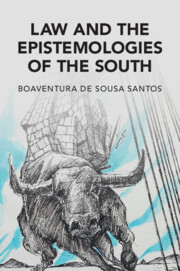Book contents
- Law and the Epistemologies of the South
- CAMBRIDGE STUDIES IN LAW AND SOCIETY
- Law and the Epistemologies of the South
- Copyright page
- Contents
- Preface
- Abbreviations
- Part One The Tragic Optimism of the Law: THE END OF A STORY
- Part Two Epistemologies of the South and the Law
- Part Three The Abyssal Law under the Mode of Abyssal Exclusion
- Eight Lawfare: A Long History
- Nine Colonial Law and Imperial Law
- Ten Colonial Legal Duality: The Creation of Legal Codes for Indigenous Populations
- Part Four Real Legal Utopias: Interrupting the State
- Part Five Real Legal Utopias: Interrupting the Law
- Part Six Real Legal Utopias: Interrupting Hegemonic Human Rights
- References
- Index
- Cambridge Studies in Law and Society
Eight - Lawfare: A Long History
from Part Three - The Abyssal Law under the Mode of Abyssal Exclusion
Published online by Cambridge University Press: 07 August 2023
- Law and the Epistemologies of the South
- CAMBRIDGE STUDIES IN LAW AND SOCIETY
- Law and the Epistemologies of the South
- Copyright page
- Contents
- Preface
- Abbreviations
- Part One The Tragic Optimism of the Law: THE END OF A STORY
- Part Two Epistemologies of the South and the Law
- Part Three The Abyssal Law under the Mode of Abyssal Exclusion
- Eight Lawfare: A Long History
- Nine Colonial Law and Imperial Law
- Ten Colonial Legal Duality: The Creation of Legal Codes for Indigenous Populations
- Part Four Real Legal Utopias: Interrupting the State
- Part Five Real Legal Utopias: Interrupting the Law
- Part Six Real Legal Utopias: Interrupting Hegemonic Human Rights
- References
- Index
- Cambridge Studies in Law and Society
Summary
In this and the following chapters I analyse the history of abyssal exclusions brought about by modern state law. I define lawfare as any performance in the name of law (a declaration, norm, sentence, official action or omission) premised on the extreme strangeness of the addressee or target, either because the latter is not fully human (the stranger as a subhuman being) or because its actions must be sanctioned without the normative constraints of the rule of law (the stranger as an internal or external enemy). The long journey of lawfare is the long journey of capitalism, colonialism and patriarchy. It has undergone multiple metamorphoses and reincarnations since the sixteenth century. From colonial law to imperial law, from the penal law of the enemy to the criminalisation of protest, and from the war on corruption to the war on migration, the abyssal exclusion of targeted social groups has been carried out by lawfare. In every instance, modern domination has found ways of separating humanity from subhumanity, friend from enemy, and non-abyssal social exclusion from abyssal exclusion. There is no reason to believe that new metamorphoses will not appear. The abyssal line is the most resilient and most fundamental structure of Western domination. Only successful struggles against capitalism, colonialism and patriarchy will bring about the progressive dislocation of the abyssal line through sustained interruptions of the institutions upon which Western domination reproduces itself, namely the state and the law.
Keywords
- Type
- Chapter
- Information
- Law and the Epistemologies of the South , pp. 205 - 238Publisher: Cambridge University PressPrint publication year: 2023



